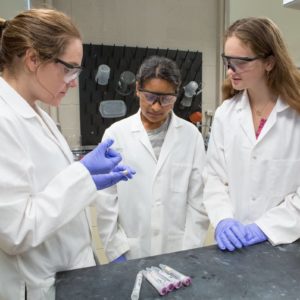As Princeton students begin to finalize internship plans, excitement and anticipation begin to take over, and we start to think about how to make the most out of our experience. Whether you are preparing for a summer internship or a one-day princeternship in the spring, you will learn the most if you begin preparing ahead of time. In this post, I will give a few tips on how to best prepare for an internship.

- Engage in guided research. This time last year, I received an offer for an internship position where I would work with yeast cells to optimize the metabolic pathways in the cell to produce isobutanol. Eager to learn more about my project, I started reading all sorts of papers with keywords “metabolic engineering” and “yeast mitochondrial pathways”. My goal was to learn as much as I could in as little time as possible, so I was reading any paper I could find. But on the first day of lab, my mentor gave me a detailed overview of the topic of my project, and he assigned me readings that would be helpful for background information. After the guided reading my mentor suggested, I realized it would have been a smarter choice to begin with these papers instead of with random google searches. Your internship mentor will know how you can best prepare for your position, so ask for readings and other tools to begin preparing. In addition, if you are working in a lab, you can begin your guided research by attending lab meetings and learning more about the different projects in the lab. Not only will this save you the extra reading, but you will also come in more prepared for the tasks you will be assigned.
2. Ask and answer questions about your research. As you read the materials that your mentor provides you with, you will likely come across multiple things that you do not understand. Make note of these uncertainties and questions and begin thinking critically about your internship topic by coming up with possible answers to your questions. Share your questions with your mentor so they can help you answer them and so they can see how much of the material you understand.
3. Ask general career questions. The goal of an internship is not only to gain experience and complete a project but also to learn more about an occupation and about various career paths. Throughout your internship, you will interact with different people in various positions, each of whom will have unique experiences and perspectives. Before starting your internship, think of questions you might want to ask about these experiences. It helps to have questions already in mind so that you can think about you really want to know. To help with this, think back to the reasons why you wanted this position in the first place.
4. Complete trainings. If you are working in a lab during your internship, you will likely need to complete safety trainings before you can start working. To avoid delays on your start date, complete these trainings as soon as possible. For Princeton lab trainings, you can visit the EHS website to sign up for safety trainings.
5. Relax. As an intern, you are not expected to be an expert in your area. Thus, it is okay if you do not come in with a complete background on your internship project. Throughout your experience, you will learn more about your project both through direct tasks you are completing and as well as through interactions with other team members and interns. Your mentors and co-workers will be there to help you along the way.
—
As I reflect back on previous internships I have had, hearing new perspectives makes the experience more enjoyable. It is important to determine what you want to gain during your time as an intern and to take action to achieve this. For more tips on how to prepare for a new internship, particularly when it involves new research projects, you can read one of my previous posts. Internships are exciting, so go in ready to learn and make the most out of your experience.
–Saira Reyes, Engineering Correspondent

